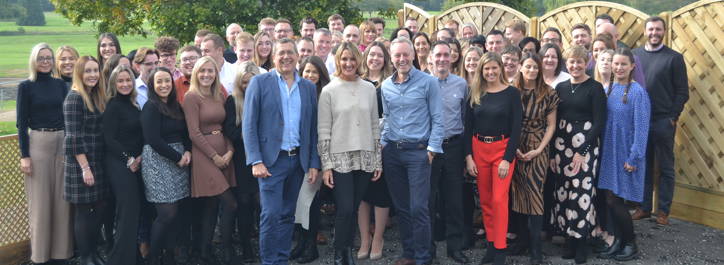HR Energy – learning about neurodiversity with Elizabeth Swan
HR Energy is a collaboration between Pure and law firm Mills & Reeve. Taking place every three months, we’ve designed it to help HR professionals access new learning and networking opportunities.
 At our July session we were joined by the inspirational Elizabeth Swan, a special educational needs and neurodiversity specialist. Elizabeth spoke to us about the different ways HR professionals and organisations can improve workplaces for neurodivergent people. The attendees were so impressed with her presentation on this interesting, but often overlooked, topic that we wanted to share it more widely. So we caught up with Elizabeth a bit later to find out more. Here’s a round-up of what she had to say.
At our July session we were joined by the inspirational Elizabeth Swan, a special educational needs and neurodiversity specialist. Elizabeth spoke to us about the different ways HR professionals and organisations can improve workplaces for neurodivergent people. The attendees were so impressed with her presentation on this interesting, but often overlooked, topic that we wanted to share it more widely. So we caught up with Elizabeth a bit later to find out more. Here’s a round-up of what she had to say.
What’s neurodiversity?
Neurodiversity is a concept that recognises and celebrates variations in the neurological functions we all have. The idea is that neurological differences like autism, ADHD and dyslexia, for example, are just natural differences in the human brain – and that we should accept and respect these. It also highlights that there’s no ‘normal’ way for the brain to function. ‘Every single person on the planet is neurodiverse,’ Elizabeth said. ‘Because all our brains are different.’
Elizabeth’s mission is to find or create learning and working environments that help neurodiverse people thrive. That includes working with professionals and policy makers to train employees to remove the stigma around neurodiversity, and improve outcomes for neurodiverse people.
‘I always say that what’s good for a neurodivergent professional is just good practice,’ Elizabeth told us. ‘So by improving policy and protocol, and changing that climate for our neurodiverse colleagues, we’re just improving outcomes for everyone.’
Are neurodiversity and mental health the same thing?
‘No, they’re not,’ Elizabeth said. ‘And it’s important not to conflate them. They do share symptoms, and if neurodivergent conditions are misdiagnosed or left untreated they can lead to mental health needs like anxiety, PTSD and depression. But they’re not the same thing.’
For this reason it’s important that organisations with mental health first aiders (employees trained to help individuals at work experiencing mental-health challenges) don’t also expect them to take responsibility for neurodiversity too.
What can neurodiverse employees do to help employers understand what they need at work?
Elizabeth works directly with neurodiverse people to help them and their employers make adjustments to help them thrive at work. And it’s something she’s very passionate about.
‘When I’m working with an individual, some of the work I do will be around identifying how they can shape their narrative with their employer. That means answering questions like “What do you want to tell your employer?”, “Who do you want to talk to?” and “How much information do you want to give?” HR can help people find ways to shape that narrative with a wellness action plan, also called a personal wellbeing plan.’
Elizabeth can then work with the individual to use this information to identify which reasonable adjustments (i.e. modifications that create more inclusive and accessible working environments) might be helpful, and then tailoring these to their role and needs.
What adjustments can employers make?
‘Lots of employers think that a reasonable adjustment is simply letting people work part-time for a bit, or start late or finish early,’ Elizabeth said. ‘And while that is one aspect, these are just flexible working arrangements. A neurodiverse employee’s needs might vary across the month or for a specific period of time, for example if their medication or treatment change. Creating an open channel of communication with line managers and HR professionals makes a dynamic support plan more achievable and more effective.’
Elizabeth went on to say that a global ADHD medication shortage has significantly affected people who use that to manage their symptoms. ‘Being aware of the impact of this on colleagues’ health and wellbeing gives employers a chance to plan proactively. Consider each individual’s sensory needs with an environmental audit of sensory triggers.’ For example:
- What bulbs do you use – and is there access to natural light? Some neurodiverse people with autism or sensory processing sensitivities might be more sensitive to the flicker or hum of fluorescent strip lights, for example, which can contribute to sensory overload.
- What’s the air supply like? Poor air quality and ventilation can exacerbate sensory sensitivities.
- Do you have standing desks? These allow for more movement which can help some neurodiverse people stay more engaged. Treadmills can also help people who need to get excess energy out can do this by walking.
- Do you have quiet spaces, so people in a state of hyper-focus won’t be disturbed? ‘Hyper-focus’ is a term often associated with conditions like ADHD when people concentrate deeply for a long period on a particular activity or subject. Providing areas like this means employers can capitalise on this neurodivergent strength.
- Do you have staff socials where there’s an expectation to make small talk? These can be incredibly stressful for some neurodiverse people.
What about line managers? How can they help neurodiverse team members?
One thing managers can do straightaway is to help employees prioritise their to-do lists. And if someone is struggling to finish a task, it’s important that line managers consider why this is happening.
‘Is the person struggling to complete a task because the results haven’t been up to their own expectations, so they’ve scrapped it and started again?’ Elizabeth asked us. ‘Neurodiverse people need clear communication of expectations from managers. Otherwise they’ll try to hit their own expectations, which are invariably too high and unrealistic. And they’re never going to achieve that level of perfection. Managers need to make sure their neurodiverse employees understand what they can (and can’t) achieve in a particular amount of time.’
Line managers also need to understand how to capitalise on neurodiverse strengths. Elizabeth said: ‘One of the biggest strengths of ADHD and autism is hyper-focus. These people might procrastinate for most of the day then get everything done in two or three hours, working at hyper-speed.’ Managers should factor this in when setting deadlines and try to break work up into chunks throughout the day. Progress checks along the way will be useful too.
Children with ADHD get 25% more time in exams. So think about the extra time that an adult with the same condition will need for processing, and make sure they get this for each task.
HR managers and partners also need to make sure line managers are following their organisation’s neurodiversity policy – and that they’re doing that consistently.
What advice does Elizabeth have for HR professionals looking to make their organisations more neuro-inclusive?
‘The best advice I can give you is to learn more. And when you know better, do better. It’s about making sure you’re proactive all the time – ask questions and look for barriers, then do what you can to remove those.
Many neurodiverse people won’t talk to their employer about their neurodiversity because of feelings of shame. Creating a neuroinclusive workplace will help them feel safe to discuss their needs and eradicate any stigma. You need to find ways to make sure your culture allows your neurodiverse employees to trust you, and that it’s inclusive.’
Want to know more?
You can find out more about Elizabeth and her work on her website. And if you’d to see more about our collaboration with Mills & Reeve, and other events we run, head to our events page.
Fancy being part of the next HR Energy? Find all the latest news, dates and how to book your spot on the website.



